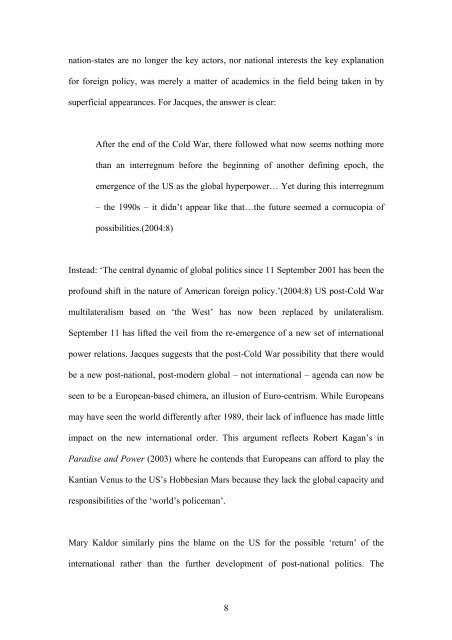After the Interregnum - David Chandler
After the Interregnum - David Chandler
After the Interregnum - David Chandler
You also want an ePaper? Increase the reach of your titles
YUMPU automatically turns print PDFs into web optimized ePapers that Google loves.
nation-states are no longer <strong>the</strong> key actors, nor national interests <strong>the</strong> key explanation<br />
for foreign policy, was merely a matter of academics in <strong>the</strong> field being taken in by<br />
superficial appearances. For Jacques, <strong>the</strong> answer is clear:<br />
<strong>After</strong> <strong>the</strong> end of <strong>the</strong> Cold War, <strong>the</strong>re followed what now seems nothing more<br />
than an interregnum before <strong>the</strong> beginning of ano<strong>the</strong>r defining epoch, <strong>the</strong><br />
emergence of <strong>the</strong> US as <strong>the</strong> global hyperpower… Yet during this interregnum<br />
– <strong>the</strong> 1990s – it didn’t appear like that…<strong>the</strong> future seemed a cornucopia of<br />
possibilities.(2004:8)<br />
Instead: ‘The central dynamic of global politics since 11 September 2001 has been <strong>the</strong><br />
profound shift in <strong>the</strong> nature of American foreign policy.’(2004:8) US post-Cold War<br />
multilateralism based on ‘<strong>the</strong> West’ has now been replaced by unilateralism.<br />
September 11 has lifted <strong>the</strong> veil from <strong>the</strong> re-emergence of a new set of international<br />
power relations. Jacques suggests that <strong>the</strong> post-Cold War possibility that <strong>the</strong>re would<br />
be a new post-national, post-modern global – not international – agenda can now be<br />
seen to be a European-based chimera, an illusion of Euro-centrism. While Europeans<br />
may have seen <strong>the</strong> world differently after 1989, <strong>the</strong>ir lack of influence has made little<br />
impact on <strong>the</strong> new international order. This argument reflects Robert Kagan’s in<br />
Paradise and Power (2003) where he contends that Europeans can afford to play <strong>the</strong><br />
Kantian Venus to <strong>the</strong> US’s Hobbesian Mars because <strong>the</strong>y lack <strong>the</strong> global capacity and<br />
responsibilities of <strong>the</strong> ‘world’s policeman’.<br />
Mary Kaldor similarly pins <strong>the</strong> blame on <strong>the</strong> US for <strong>the</strong> possible ‘return’ of <strong>the</strong><br />
international ra<strong>the</strong>r than <strong>the</strong> fur<strong>the</strong>r development of post-national politics. The<br />
8
















